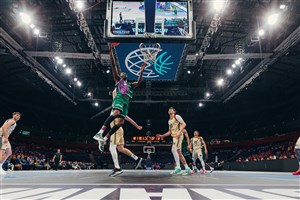
Welcome Herb Brown! Welcome back Tom Maher!
KUALA LUMPUR (Mageshwaran’s AsiaScope) - One of the oldest tongue-twisters learnt in childhood runs thus: one who does not know what he knows not, knows not what he knows. To make it a little more explicit: the foremost and first step in learning is admitting, accepting and acknowledging what you do not know. And development in all walks of life, including sport, begins with learning.
I don't intend to get into a homily in philosophy, but I couldn't find a better and simpler analogy to explain last week's welcome developments in two of the most accomplished women's basketball teams in FIBA Asia- China and Japan.
The two giants of women's basketball in FIBA Asia have sought and drafted the help of experts, both legendary figures in their own right, in shaping the fortunes of their national teams that will play the 25th FIBA Asia Championship for Women in Bangkok, Thailand later this year.
Contrasting as their immediate recent records are - China are looking to extend their dominance in FIBA Asia women’s basketball, while Japan are aiming to shrug off their longstanding bridesmaid tag - both teams share a common ground in the fact that the current set of players represent a shift in generation.
If China have brought back Australian legend Tom Maher - who led them to a Semi-Final finish at the 2008 Beijing Olympics - as their coach to shape the youngsters and consolidate the gains made by their predecessors, Japan have roped in former NBA legendary coach Herb Brown to help their younger lot avoid the mistakes made by their seniors. And to say the least, both have their work cut out.
Maher will have only three players- Miao Lijie, Nan Chen and Bian Lan - who were a part of his team in Beijing and I'm not even sure how much more time these three seasoned campaigners have left in their illustrious careers.
But the advantage for Maher is the attitude and approach of the Chinese team which has undergone a sea-change between 2007 when he first came in and now. This fact was very evident in the manner the team played at the 21st FIBA Asia U18 Championship for Women in Johor Bahru, Malaysia) last year - when they shunned speed for solidity and learning to use the shot clock rather than dribbling and shooting once they had possession.
In a manner of speaking, Maher himself can take credit for bringing in that transformation, having sown the seeds for change during his previous stint with the Chinese.
Brown is in a different situation, but his goals would remain the same. For one, this is his first stint with a FIBA Asia team. He too will not have many players of experience given that Yuko Oga and Asami Yoshida are in the twilight of their careers.
Again, like Maher, Brown has the advantage of a changing generation of players who are willing to run the extra mile hard and shed those extra drops of sweat in working towards a comprehensive and composite plan, which doesn’t stop at scoring alone.
The likes of Yuka Mamiya and Ramu Tokashiki have shown enough promise that they have the potential to take Japanese women’s basketball forward and, with players like Moeko Nagaoka and Megumi Shinohara lurking around to step in when necessary, Brown would find his job of ‘advising’ the coach that much more beneficial. Getting the coach who gets into the right vibes with Brown is the next step for Japan.
Now, the success of China and Japan at the 25th FIBA Asia Championship for Women can never be doubted – irrespective of the medal they win China and Japan can both be counted as certainties to qualify to the 2014 FIBA World Championship for Women.
The task, expectations and challenges for Maher and Brown is to lift the level of these teams when they head to Turkey.
So long…
S Mageshwaran
FIBA Asia
FIBA’s columnists write on a wide range of topics relating to basketball that are of interest to them. The opinions they express are their own and in no way reflect those of FIBA.
FIBA takes no responsibility and gives no guarantees, warranties or representations, implied or otherwise, for the content or accuracy of the content and opinion expressed in the above article.

















